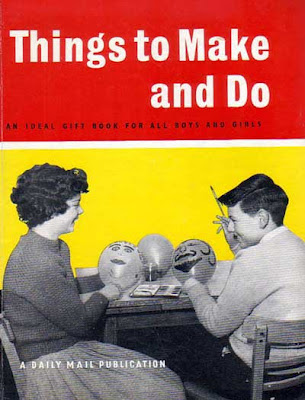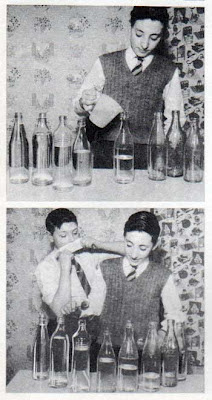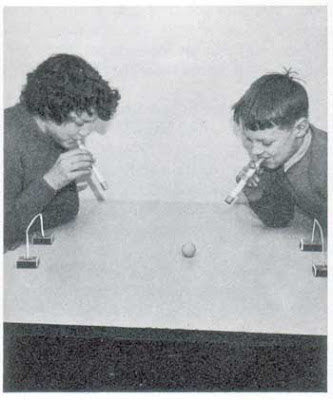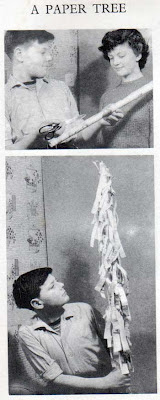By nice, my mother means the sorts of clothes that faintly resemble the staff uniforms of building society employees in the early 90s: pastel, understated floral patterns in washing machine-friendly artificial fibres.
As for size, Lewes is not fat town. Nationally, 66% of men of my age and height are heavier than me, but in Lewes I feel like a pasty-eating slob compared to the gaunt, earnest-looking men with beards who think nothing of starting the day with a 20-mile cycle ride. I should move to Walsall.
We needed to go further afield. I asked my mother if she'd like to try Eastbourne, a coastal resort with the highest number of people over 80 in the UK. Without pausing for thought, she replied "Not 'arf!"
 As I parked the car at Lewes railway station, my mother remarked that this would be the first time that she'd been on a train in 30 years. I found it hard to believe, but her look of wonder as we boarded the air-conditioned carriage was genuine.
As I parked the car at Lewes railway station, my mother remarked that this would be the first time that she'd been on a train in 30 years. I found it hard to believe, but her look of wonder as we boarded the air-conditioned carriage was genuine.Suddenly, my mother looked worried: "But we can't sit here. This is 1st class isn't it?". I assured her that it wasn't and that the rail network had changed a lot since the days when scuffy men in donkey jackets half-heartedly ambled along the platform with a broom in one hand and a cigarette in the other. "Cor!" my mother replied, "It's posh isn't it!"
For me, it was an unremarkable train journey. For my mother, it was time travel.
Many aspects of the service industries have improved during the last three decades. This is obviously a 'good thing', but during my visit to Eastbourne's rather depressing Arndale Centre, I was reminded of the darker side of this cultural shift by a huge poster advertising 'exciting' job opportunities in a new branch of River Island.
Since when was working in a clothes shop exciting? You put clothes on display, tidy up the mess that customers have made and occasionally operate the till. It might be enjoyable if you like the work and get on with your colleagues, but surely the job's pretty low on thrills apart from the odd spat with a shoplifter.
Sadly, the River Island advert is symptomatic of a growing trend in which retailers want their employees souls as well as their bodies. You can work as hard as you like, but if you're not excited about the brand, you're not being part of the team. It's an employers' market.
 When I joined the Ottakar's bookshop chain in the mid-90s, there was no nonsense about having to be excited. The senior managment used to motivate staff by giving them a lot of autonomy and rewarding success with generous bonuses. It worked. Staff were generally enthusiastic and, sometimes, even excited, but we didn't start grinning inanely at every customer who walked in the door.
When I joined the Ottakar's bookshop chain in the mid-90s, there was no nonsense about having to be excited. The senior managment used to motivate staff by giving them a lot of autonomy and rewarding success with generous bonuses. It worked. Staff were generally enthusiastic and, sometimes, even excited, but we didn't start grinning inanely at every customer who walked in the door.However in today's economic climate, bonuses are thin on the ground and the main motivational tool is fear:
"Work hard, look as if you're really enjoying yourself and you might get to keep your job, but don't think you can fool us. If you're in a shop, leisure centre or museum, we have mystery customers. If you're in a call centre we will be listening to you. As for the drivers, we're tracking you all the way. Any unscheduled stops will be monitored. No-one is beyond our reach"
I'm very pleased that service has improved since the days when many shop assistants talked amongst themselves and treated customers like an inconvenience, but the growing trend of subjecting poorly-paid employees to an Orwellian regime of constant surveillance and 'thought police' who look for any signs of dissent disturbs me deeply.
In some cases, the result isn't even good service, but manic, rather desperate and intrusive behaviour that is deeply off-putting. When I walk in a clothes shop I want to be left alone, not befriended by an insincere assistant who is clearly terrified that I might be a mystery shopper, beaming at me every time I glance in their direction. Also, I'd like to be able to just buy something without any nonsense about bars of chocolate, loyalty cards, mobile phone top-ups and stamps.
During my last few months at Waterstone's, we were encouraged to get 'added value' from purchases by asking customers if there was anything else they wanted and, if there wasn't, would they be interested in buying "this £12 book on wine for £5? No? Well how about joining our loyalty card scheme..."
Some people responded, but most looked embarrassed or irritated and couldn't get out of the shop quickly enough. We were able to measure how many customers joined the loyalty card scheme, but not how many were put off by this approach. I hated it and knew that it was time to leave.
High street retailers are trying to save themselves by squeezing as much money as possible out of their diminishing pool of customers, but their methods are simply driving people like me towards the hassle-free environment of the internet. Sadly, they usually can't give their customers the thing they really want: value.
Back in the Arndale Centre I rejoined my mother, who was in Bon Marche, buying a coat that looked as if it would repel a chemical warfare attack. The shop assistant was desperately trying to sign my mother up to a new loyalty card scheme, but something wasn't working properly and I sensed a growing desperation. "I'm really sorry madam. I'll just try one more time..."
As we left the shop, my mother turned to me and said "That poor woman. I don't suppose I'll ever use this thing."










































